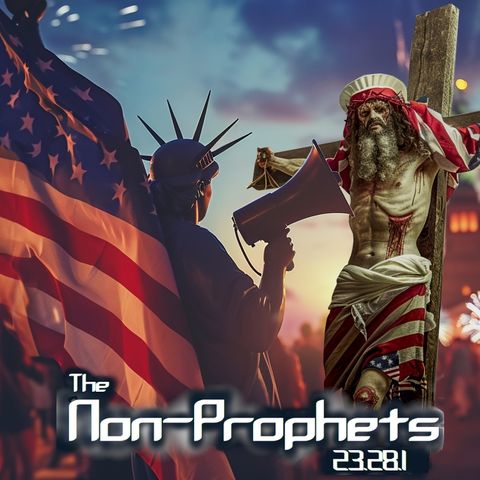The Baptism of the Pledge of Allegiance

Download and listen anywhere
Download your favorite episodes and enjoy them, wherever you are! Sign up or log in now to access offline listening.
The Baptism of the Pledge of Allegiance
This is an automatically generated transcript. Please note that complete accuracy is not guaranteed.
Description
Civil religion as a gateway to Christian nationalism Religion News Service, By Beau Underwood and Brian Kaylor, on June 25, 2024 https://religionnews.com/2024/06/25/civil-religion-as-a-gateway-to-christian-nationalism/ The discussion begins by questioning the significance of...
show moreReligion News Service, By Beau Underwood and Brian Kaylor, on June 25, 2024
https://religionnews.com/2024/06/25/civil-religion-as-a-gateway-to-christian-nationalism/
The discussion begins by questioning the significance of Christianity in American life. Historically, politics and Christianity were intertwined, but the conversation aims to explore whether this remains true today or if it ever really was. Eli Slack introduces the concept of civil religion, which refers to the quasi-religious loyalty and rituals found in American political life.
A pivotal moment highlighted is from 1954 when President Dwight Eisenhower signed legislation to add "under God" to the Pledge of Allegiance. This change, inspired by Reverend George Dougherty's sermon, aimed to distinguish American Christian democracy from Soviet atheism. Dougherty controversially labeled atheists as "spiritual parasites," yet today, 21% of Americans claim no religious affiliation. This significant shift points to a growing divergence from traditional religious adherence in American society.
The conversation delves into the notion of civil religion, emphasizing how government rituals and hierarchies mirror those of religion. Eli and Rob discuss the similarities between American politics and Christianity, particularly the authoritative structures and rules. They ponder the intertwining of these ideologies and question if the fundamental values of Christianity truly align with American ideals of life, liberty, and the pursuit of happiness.
Rob reflects on America's founding, noting that many settlers fled religious persecution to practice their faith freely. The framers of the Constitution emphasized the separation of church and state to avoid the religious conflicts they escaped. Despite this, there remains a continuous push to redefine America through a religious lens, often ignoring the Constitution's intent.
Kelly points out the evolving relationship between Christianity and non-religious Americans. The percentage of Americans unaffiliated with any religion has grown significantly, indicating a shift away from traditional religious influence. This change challenges the idea that Christianity is fundamental to American identity, as proposed by Dougherty in his sermon.
Eli discusses the misuse of religious rhetoric by politicians to score political points, despite their understanding of the establishment clause. This manipulation often appeals to Christian constituents who view their faith as superior and exempt from constitutional restrictions. This approach fosters division rather than unity.
The panel debates the role of religion in society, with Rob asserting that while religion has historically carved a place for itself, society can function ethically without it. He highlights the importance of compassion and genuine human connection over dogmatic adherence. The misuse of religious influence for political gain, as seen in Dougherty's sermon, perpetuates power imbalances and societal division.
Kelly raises concerns about the rise of Christian nationalism and its impact on American politics. He notes that any movement to integrate religion into government is now tainted by nationalist extremism, making coherent religious advocacy difficult. This shift highlights the need for liberal Christians to ally with secularists to combat extremist ideologies.
The discussion concludes with reflections on patriotism and loyalty to one's country. Eli emphasizes the importance of recontextualizing patriotism to focus on caring for fellow citizens rather than blind nationalism. The panel agrees that fostering compassion and understanding is crucial in bridging societal divides and countering extremist views.
Ultimately, the conversation underscores the complex and evolving relationship between Christianity and American identity, highlighting the need for dialogue, compassion, and a commitment to the principles of the Constitution in navigating these challenges.
The Non-Prophets, Episode 23.28.1 featuring Jimmy Jr., Rob, Eli Slack and Kelley Laughlin
Information
| Author | Atheist Community of Austin |
| Organization | Atheist Community of Austin |
| Website | - |
| Tags |
Copyright 2024 - Spreaker Inc. an iHeartMedia Company

Comments